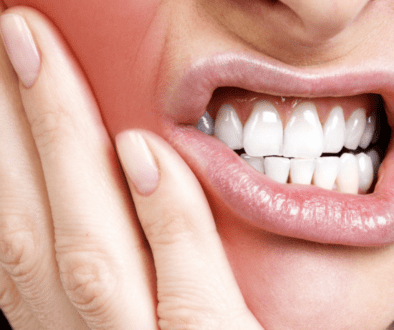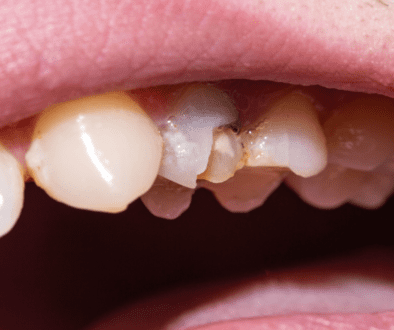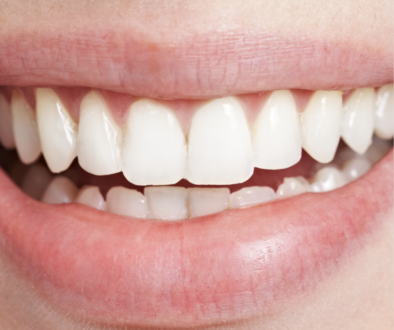If you’ve ever experienced sudden tooth sensitivity, you know how uncomfortable and disruptive it can be. One moment, you’re enjoying your favourite ice cream; the next, you’re wincing in pain.
This blog will explore the possible explanations behind why your teeth hurt suddenly and the various causes of tooth sensitivity. We’ll also discuss treatment options and when it’s essential to seek help from a dentist.
Tooth Sensitivity Causes and Treatment
Tooth sensitivity can arise due to various factors, and it’s essential to pinpoint the exact cause to provide appropriate treatment. Some common causes include gum recession, enamel erosion, cavities, gum infection, cracked tooth or crown, sinus infection, and jaw clenching or grinding. Let’s look more into why you could be suddenly experiencing sensitive teeth and understand what causes teeth sensitivity suddenly.
Tooth Decay and Sudden Toothache
Tooth decay, commonly known as cavities, occurs when bacteria in the mouth produce acids that attack the tooth’s outer layer (enamel) and create small holes. As the decay progresses deeper into the tooth, it can reach the sensitive inner layers, including the dentin and pulp, causing a sudden toothache and heightened sensitivity. It’s not uncommon to wonder why your teeth hurt suddenly, as the decay can sometimes reach a point where it triggers sudden sensitive tooth pain.
Cavities can be painful, especially when exposed to hot, cold, sweet, or sugary foods. Early detection and treatment by a dentist are essential to prevent further decay and alleviate discomfort through dental fillings or other restorative procedures. People often ask why their teeth are suddenly getting cavities, and addressing such questions early can prevent extensive dental work.
Gum Recession and Sensitive Teeth
Receding gums pull back from the tooth surfaces, exposing parts of the tooth that are typically protected by gum tissue. This exposure of the tooth roots can result in tooth sensitivity, especially when consuming hot, cold, sweet, or acidic foods and drinks. You may find your teeth suddenly very sensitive, particularly when exposed to cold stimuli, leading to a situation where you’re left asking, why is my tooth suddenly sensitive to cold.
The roots of the teeth are not covered by enamel like the crowns, making them more sensitive to external stimuli. When the roots of sensitive teeth become exposed, the dentin (a softer layer beneath the enamel) and the nerve within the tooth become more vulnerable to irritants. Proper oral hygiene, including gentle brushing, flossing, and professional dental care, can help manage gum recession and reduce sensitivity. People often compare tooth sensitivity vs toothache, but both can cause significant discomfort.
Tooth Enamel Erosion and Sensitivity
Enamel erosion is the gradual loss of the outer layer of your teeth caused by acidic substances. Acidic foods, beverages, and stomach acid from conditions like acid reflux can erode the enamel over time. Enamel is responsible for protecting the dentin and nerve of the tooth. As it wears away, the dentin becomes exposed, leading to tooth sensitivity. You might suddenly find your tooth sensitive to cold all of a sudden, causing discomfort with certain foods and beverages.
Patients with enamel erosion may experience discomfort when consuming hot, cold, sweet, or acidic foods. To prevent further erosion, limiting the intake of acidic substances, practising good oral hygiene, and using fluoride-based dental products to strengthen and protect the remaining enamel is essential. Some people wonder, why are my teeth really sensitive, and it’s often due to such enamel loss.
Gum Infection and Gum Disease
Gum infections, such as gingivitis or periodontitis, occur when bacteria accumulate in the gum line and cause inflammation. As the infection progresses, it can lead to gum recession, exposing the tooth roots and causing gum sensitivity and bleeding gums. The inflamed gums may also contribute to tooth sensitivity, making chewing and brushing uncomfortable. This can often make you feel your back teeth sensitive all of a sudden.
Proper oral hygiene, regular dental cleanings, and professional treatment for gum disease can help manage the infection and reduce gum and tooth sensitivity. Left untreated, gum disease can lead to more severe oral health issues, so early intervention is crucial.
Tooth Sensitivity After Dental Work
Experiencing tooth sensitivity after dental work is relatively common. Some procedures, such as fillings or dental crowns, may cause temporary inflammation of the pulp or the tooth’s nerve, leading to sensitivity. You might find yourself questioning, why my teeth suddenly hurt, following a dental procedure, but this discomfort usually diminishes as the tooth heals.
The degree of sensitivity varies from person to person and depends on the complexity of the dental work performed. In most cases, the discomfort should diminish as the tooth heals. However, if the sensitivity persists or becomes severe, it may indicate an underlying issue that requires immediate attention from your dentist. Your dentist can evaluate the area and recommend appropriate measures to alleviate the sensitivity and ensure proper healing.
Cracked Tooth
A cracked tooth can be a source of significant discomfort. When a tooth is cracked, it creates an opening that exposes the sensitive inner layers of the tooth to external stimuli. This exposure can lead to heightened tooth sensitivity and pain, particularly when biting down or consuming hot or cold substances. You might suddenly find your tooth very sensitive all of a sudden, especially when eating or drinking something cold.
The nerve within the tooth becomes susceptible to irritants, causing sharp or throbbing sensations. If you suspect you have a cracked tooth, it’s essential to seek an emergency dentist to prevent further damage and receive appropriate treatment, which may involve dental bonding, a crown replacement, or in severe cases, root canal therapy.
Sinus Infection and Tooth Pain
It might come as a surprise, but sinus infections can cause tooth pain. The sinuses are air-filled cavities located close to the upper teeth. When these sinuses become infected or inflamed, they can exert pressure on the surrounding areas, including the upper teeth, leading to referred tooth pain. Many people are unaware that a sinus infection can cause tooth sensitivity to cold, making it important to distinguish the source of the discomfort.
The discomfort is often mistaken for dental issues, as the exact source of the pain may not be immediately apparent. This type of tooth pain is usually felt in multiple upper teeth and is often accompanied by other sinus infection symptoms, such as nasal congestion and facial pressure. Addressing the sinus infection and alleviating the sinus pressure usually resolves the tooth pain.
Jaw Clenching and Tooth Sensitivity
Frequent jaw clenching or teeth grinding, also called bruxism, can have detrimental effects on dental health. When you clench or grind your teeth, it puts excessive pressure on the teeth, causing the enamel to wear down gradually. You might notice sensitive tooth all of a sudden, as the wear on your enamel can expose the dentin layer.
The underlying dentin becomes exposed as the protective enamel diminishes, leading to tooth sensitivity. Clenching or grinding often occurs during sleep or stressful situations, making many people unaware of their habits. If you suspect you have bruxism or experience tooth sensitivity, discuss it with your dentist. They can provide a custom-fitted mouth guard to protect your teeth during sleep and offer suggestions to manage stress and reduce clenching during waking hours.
Tooth Sensitivity After At-Home Teeth Whitening
At-home teeth whitening treatments can increase sensitivity and is a common occurrence experienced by some individuals. Teeth whitening products, such as whitening strips or bleaching gels, contain active ingredients that penetrate the tooth enamel to remove surface stains and brighten the teeth.
The enamel’s pores may temporarily open during this process, exposing the sensitive dentin layer beneath. As a result, some people may notice increased tooth sensitivity, especially to hot or cold temperatures and certain foods. This is usually temporary sensitivity and should subside within a few days after completing the whitening treatment. To minimise discomfort, it is advisable to use sensitivity-reducing toothpaste during the whitening process and avoid consuming extremely hot or cold substances.
If the sensitivity persists or becomes severe, it’s best to consult with a dentist to ensure there are no underlying issues and to discuss appropriate management strategies; getting professional teeth whitening at your dentist to avoid any damage to your teeth is recommended.
Toothache with Fever
Experiencing a toothache along with a fever is a concerning sign that could indicate a dental infection or abscess. Dental infections can spread rapidly, and the presence of fever suggests that the infection may have become more severe. It’s crucial to seek dental care promptly to prevent further complications. An untreated dental infection can spread bacteria to other parts of the body, posing a risk to your overall health.
Sensitivity-Reducing Toothpaste and Treatment Options
Sensitivity-reducing toothpaste can be a helpful tool in managing mild tooth sensitivity. These toothpaste varieties are formulated with desensitising agents that help block the nerve pathways, reducing sensitivity to external stimuli.
For many individuals with mild sensitivity, using such toothpaste regularly can provide relief. However, professional dental treatment may be necessary for more severe or persistent cases of tooth sensitivity. Your dentist will conduct a comprehensive examination to determine the underlying cause of the sensitivity. Treatment options may include dental restorations to address enamel erosion or cavities, fluoride treatments to strengthen enamel, or desensitising treatments to provide longer-lasting relief.
Finding a Dentist for Tooth Pain
Finding a reliable dentist is paramount if you’re experiencing sudden tooth pain or discomfort. Severe pain can indicate various dental issues, and early intervention is crucial to prevent the condition from worsening. People often wonder, what causes sudden toothache, and a professional dentist can help you find the answer.
Start by seeking recommendations from family, friends, or colleagues for reputable dentists in your area. Look for dentists with positive reviews and a track record of providing quality care. A dental professional will conduct a thorough examination to identify the cause of your tooth pain, which may include X-rays or other diagnostic tests. Regular dental check-ups are essential to address tooth pain and prevent dental problems before they become more severe. Building a strong relationship with a trusted dentist ensures that you receive personalised care and enjoy optimal dental health.
Find A Solution To Your Sensitive Teeth
Tooth sensitivity can result from various factors, ranging from simple gum recession to more severe issues like tooth decay or gum infections. Identifying the cause is essential to determine the appropriate treatment. If you experience sudden tooth sensitivity or persistent toothache, don’t hesitate to reach out to a dentist for a thorough examination and personalised care. Remember, good oral hygiene practices brushing your teeth twice daily, flossing daily, and regular dental check-ups can go a long way in preventing tooth sensitivity and maintaining a healthy smile.
Get in contact With Chrysanth Dental Care today!
Find Chrysanth Dental Care here:
493 Cambridge Heath Rd, London E2 9BU




